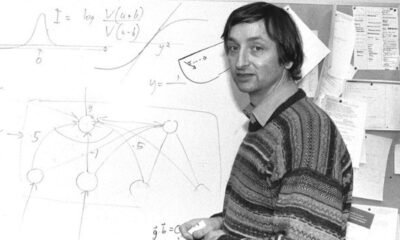Top Stories
Tesla offers pay package to CEO Elon Musk that could be worth up to $1 trillion

Tesla’s board of directors is asking shareholders to approve a new pay package for CEO Elon Musk that could be worth up to $1 trillion in a decade, representing one of the richest compensation packages in corporate history.
According to a regulatory filing published Friday, the electric car maker’s board wants to award Musk about 423 million shares, which today have a value of $143 billion, if the company hits certain profitability, production and market capitalization milestones.
“Tesla does not currently have a long-term CEO performance award in place to retain and incentivize Elon to focus his energies on Tesla and lead us through this pivotal moment in our history. It’s time to change that,” board members said in a letter to shareholders.
For Musk to earn the full pay package, Tesla would have to reach a market cap of $8.5 trillion — about eight times its current value — in 10 years. At that level, the stock awarded to Musk would be worth more than $1 trillion.
Tesla would also need to hit certain operational targets for Musk to collect the full pay package. Those include delivering 20 million vehicles; producing 1 million of the automaker’s self-driving “robotaxis”; and manufacturing 1 million of the company’s humanoid robots, dubbed Optimus, which are currently under development.
Musk would also receive more voting power over Tesla under the proposed plan.
The company’s new compensation scheme “represents a critical next step to keep Musk as CEO at least until 2030,” Wedbush analyst Dan Ives said in a report, adding that Tesla is “heading into one of the most important stages of its growth cycle with the autonomous and robotics future now on the doorstep.”
The entrepreneur’s previous compensation has drawn legal challenges. In 2018, Tesla investors filed a lawsuit challenging Musk’s $56 billion pay package, alleging that he and the company’s board had breached their fiduciary duties. In December, a Delaware judge ordered the company to revoke that award.
In August, Tesla said it was granting Musk shares totaling around $29 billion.
Tesla’s vehicle sales have stalled over the last year, dropping 1% in 2024 from the previous year — the car maker’s first annual sales decline in 12 years — amid mounting competition from rival automakers and unhappiness among some customers at Musk’s support for President Trump. In its most recent quarter, Tesla reported that quarterly profits plunged from nearly $1.4 billion to $409 million, while revenue also sank.
Tesla’s stock price has slumped in 2025, but has risen more than 54% over the last 12 months and roughly 143% over the last five years.
contributed to this report.
Top Stories
Anthropic pays authors $1.5 billion to settle copyright infringement lawsuit

NEW YORK (AP) — Artificial intelligence company Anthropic has agreed to pay $1.5 billion to settle a class-action lawsuit by book authors who say the company took pirated copies of their works to train its chatbot.
The landmark settlement, if approved by a judge as soon as Monday, could mark a turning point in legal battles between AI companies and the writers, visual artists and other creative professionals who accuse them of copyright infringement.
The company has agreed to pay authors or publishers about $3,000 for each of an estimated 500,000 books covered by the settlement.
“As best as we can tell, it’s the largest copyright recovery ever,” said Justin Nelson, a lawyer for the authors. “It is the first of its kind in the AI era.”
A trio of authors — thriller novelist Andrea Bartz and nonfiction writers Charles Graeber and Kirk Wallace Johnson — sued last year and now represent a broader group of writers and publishers whose books Anthropic downloaded to train its chatbot Claude.
A federal judge dealt the case a mixed ruling in June, finding that training AI chatbots on copyrighted books wasn’t illegal but that Anthropic wrongfully acquired millions of books through pirate websites.
If Anthropic had not settled, experts say losing the case after a scheduled December trial could have cost the San Francisco-based company even more money.
“We were looking at a strong possibility of multiple billions of dollars, enough to potentially cripple or even put Anthropic out of business,” said William Long, a legal analyst for Wolters Kluwer.
U.S. District Judge William Alsup of San Francisco has scheduled a Monday hearing to review the settlement terms.
Anthropic said in a statement Friday that the settlement, if approved, “will resolve the plaintiffs’ remaining legacy claims.”
“We remain committed to developing safe AI systems that help people and organizations extend their capabilities, advance scientific discovery, and solve complex problems,” said Aparna Sridhar, the company’s deputy general counsel.
As part of the settlement, the company has also agreed to destroy the original book files it downloaded.
Books are known to be important sources of data — in essence, billions of words carefully strung together — that are needed to build the AI large language models behind chatbots like Anthropic’s Claude and its chief rival, OpenAI’s ChatGPT.
Alsup’s June ruling found that Anthropic had downloaded more than 7 million digitized books that it “knew had been pirated.” It started with nearly 200,000 from an online library called Books3, assembled by AI researchers outside of OpenAI to match the vast collections on which ChatGPT was trained.
Debut thriller novel “The Lost Night” by Bartz, a lead plaintiff in the case, was among those found in the dataset.
Anthropic later took at least 5 million copies from the pirate website Library Genesis, or LibGen, and at least 2 million copies from the Pirate Library Mirror, Alsup wrote.
The Authors Guild told its thousands of members last month that it expected “damages will be minimally $750 per work and could be much higher” if Anthropic was found at trial to have willfully infringed their copyrights. The settlement’s higher award — approximately $3,000 per work — likely reflects a smaller pool of affected books, after taking out duplicates and those without copyright.
On Friday, Mary Rasenberger, CEO of the Authors Guild, called the settlement “an excellent result for authors, publishers, and rightsholders generally, sending a strong message to the AI industry that there are serious consequences when they pirate authors’ works to train their AI, robbing those least able to afford it.”
The Danish Rights Alliance, which successfully fought to take down one of those shadow libraries, said Friday that the settlement would be of little help to European writers and publishers whose works aren’t registered with the U.S. Copyright Office.
“On the one hand, it’s comforting to see that compiling AI training datasets by downloading millions of books from known illegal file-sharing sites comes at a price,” said Thomas Heldrup, the group’s head of content protection and enforcement.
On the other hand, Heldrup said it fits a tech industry playbook to grow a business first and later pay a relatively small fine, compared to the size of the business, for breaking the rules.
“It is my understanding that these companies see a settlement like the Anthropic one as a price of conducting business in a fiercely competitive space,” Heldrup said.
The privately held Anthropic, founded by ex-OpenAI leaders in 2021, earlier this week put its value at $183 billion after raising another $13 billion in investments.
Anthropic also said it expects to make $5 billion in sales this year, but, like OpenAI and many other AI startups, it has never reported making a profit, relying instead on investors to back the high costs of developing AI technology for the expectation of future payoffs.
The settlement could influence other disputes, including an ongoing lawsuit by authors and newspapers against OpenAI and its business partner Microsoft, and cases against Metaand Midjourney. And just as the Anthropic settlement terms were filed, another group of authors sued Apple on Friday in the same San Francisco federal court.
“This indicates that maybe for other cases, it’s possible for creators and AI companies to reach settlements without having to essentially go for broke in court,” said Long, the legal analyst.
The industry, including Anthropic, had largely praised Alsup’s June ruling because he found that training AI systems on copyrighted works so chatbots can produce their own passages of text qualified as “fair use” under U.S. copyright law because it was “quintessentially transformative.”
Comparing the AI model to “any reader aspiring to be a writer,” Alsup wrote that Anthropic “trained upon works not to race ahead and replicate or supplant them — but to turn a hard corner and create something different.”
But documents disclosed in court showed Anthropic employees’ internal concerns about the legality of their use of pirate sites. The company later shifted its approach and hired Tom Turvey, the former Google executive in charge of Google Books, a searchable library of digitized books that successfully weathered years of copyright battles.
With his help, Anthropic began buying books in bulk, tearing off the bindings and scanning each page before feeding the digitized versions into its AI model, according to court documents. That was legal but didn’t undo the earlier piracy, according to the judge.
Top Stories
Alcaraz beats Djokovic at US Open for 3rd Slam final in a row

NEW YORK (AP) — Carlos Alcaraz used his youth, athleticism and creativity to assert himself against the much more accomplished, but also much older, Novak Djokovic and beat the 24-time major champion 6-4, 7-6 (4), 6-2 at the U.S. Open on Friday for a berth in his third consecutive Grand Slam final.
By the end, Djokovic was “gassed out,” as he described it afterward, and seemed resigned to the result. The 38-year-old from Serbia reached the semifinals at all four Slams this season but exited in that round each time, three via losses to No. 2 Alcaraz, 22, or No. 1 Jannik Sinner, 24.
“It’s frustrating on the court when you are not able to keep up with that level physically, but at the same time, it’s something also expected, I guess,” Djokovic said. “It comes with time and with age.”
Alcaraz will face either defending champion Sinner or No. 25 Felix Auger-Aliassime for the championship on Sunday, when President Donald Trump plans to attend. Sinner is trying to become the first repeat men’s champion in New York since Roger Federer won the hard-court tournament five years in a row from 2004 through 2008.
Alcaraz hasn’t dropped a set as he pursues his sixth major title and second at Flushing Meadows. He defeated Sinner at the French Open in June and lost to his rival at Wimbledon in July.
Go back to April, and Alcaraz is 44-2, making it to the finals at each of his last eight tour-level events.
“It’s something that I’m working on, just the consistency on the matches, on the tournaments, on the year, in general. Just not having up-and-downs in (a) match,” Alcaraz said. “Probably, I’m just getting mature, just getting to know myself much better, what I need on, off the court.”
Alcaraz had lost his two most recent matches against Djokovic — in the gold-medal final at the Paris Olympics last year, and in the Australian Open quarterfinals this January.
“It’s not easy playing against him, to be honest,” Alcaraz said. “I’m thinking about the legend; what he has achieved in his career. It’s difficult not to think about it.”
Djokovic’s bid to become the first player in the sport’s history to get Slam No. 25 was blocked again, and he thinks part of the issue is trying to overcome much younger men in best-of-five set matches.
“I still want to play … (a) full Grand Slam season next year,” Djokovic said. “Let’s see whether that’s going to happen or not, but … Slams are Slams. They are just different from any other tournament. They are the pillars of our sport, the most important tournaments we have. But I do fancy my chances a bit more in best-of-three.”
Alcaraz and Sinner have combined to collect the past seven major championships and nine of the last 12. Djokovic won the other three in that span, most recently at the 2023 U.S. Open.
Djokovic’s shots were not quite on-target early and, but for a brief interlude in the second set, his usual verve was not present. He rolled his eyes after one miss, grimaced after another. At changeovers, he flexed or stretched his neck, which bothered him earlier in the tournament, and also was looked at by a trainer.
There also was the occasional bit of brilliance, including a two-handed backhand passing shot that drew raucous roars from the crowd, which often cried out his nickname, “No-le!” and seemed to want to will him to at least make things more competitive, if not win.
Djokovic celebrated by strutting to his towel box while shaking his right hand over and over, as though to say, “Hoo-boy! How nice was that?”
Djokovic even managed to steal one of Alcaraz’s service games while taking a 3-0 lead in the second set. Might this portend a long, tight match?
Nope. Alcaraz immediately snapped to, taking the next three games, including one scooped cross-court forehand passing winner that was so superb even Djokovic felt compelled to applaud with his racket.
Alcaraz never faced another break point.
“Today, I’d say, it wasn’t the best level of the tournament for me,” said Alcaraz, whose 30 unforced errors were the same as Djokovic’s total, “but I just kept a cool level (from) the beginning until the last point.”
He was wearing a pink, sleeveless shirt and sporting nearly a full head of hair less than two weeks after showing up with a buzz cut he said was necessary when his brother tried to play barber but messed up.
Asked whether he’ll stick with the new look if he wins on Sunday, Alcaraz smiled and replied: “Even better. You will see. … Surprise, surprise.”
___
Howard Fendrich has been the AP’s tennis writer since 2002. Find his stories here: https://apnews.com/author/howard-fendrich. More AP tennis: https://apnews.com/hub/tennis
Top Stories
College of Charleston instructor among victims killed in Lisbon funicular crash

The College of Charleston confirmed on Friday that one of its instructors was among the 16 people killed in the crash of the popular funicular railway in Lisbon on Wednesday, which shocked Portugal and led to pointed questions about the cause of the accident.
Heather Hall, a member of the faculty of the Department of Teacher Education, was the only American killed in the accident, which also injured 21. Among the dead were five Portuguese citizens, two South Koreans, one Swiss, three British citizens, two Canadians, one French and one Ukrainian, according to the Portuguese police.
Hall had been in Lisbon to speak at a conference, Fran Welch, the dean of the School of Education, said in a statement.
“This is a tragic loss for all of us,” Welch said. “As an alumna of the College (‘97) and a dynamic instructor with a specialization is special education, she shared her love of travel with her students.”
The statement noted that Hall had been a Fulbright Scholar in Ghana and had taken her students on study abroad trips to Italy.
Welch added, “Her energy, kindness and student-centeredness will be deeply missed.”
Hall’s passion for travel is highlighted on her Facebook page which shows photos of her in Havana, Venice and at the Colosseum in Rome.
The wreckage of the funicular, known as the Elevador da Glória, was cleared overnight and put in police custody.
Alexandre Rodrigues, the commander of the Lisbon fire brigade, told reporters Wednesday that authorities were alerted about the derailment at 6:01 p.m. local time (12:01 p.m. ET) and arrived within three minutes. The funicular derailed and crashed into a building, he said.
Becky Britton, of Minnesota, was vacationing in the city with her husband when she walked past the scene and saw what she described as carnage.
“I feel sad, and when you’re here it’s real. If it happened to us, our families, we would have been notified and that’s just devastating,” she said.
Emergency officials said all victims were pulled out of the wreckage in just over two hours.
Classified as a national monument, the Elevador da Glória funicular connected Restauradores Square to the Jardim de São Pedro de Alcântara, a popular garden in the Bairro Alto neighborhood.
The service, which was inaugurated in 1885, goes up and down a few hundred yards of a hill on a curved, traffic-free road in tandem with one going the opposite way. It is a popular attraction with Lisbon’s tourists, and long lines of people typically form for the brief rides.
Harnessed by steel cables, it can carry more than 40 people, seated and standing, and it is also commonly used by Lisbon residents.
The government’s Office for Air and Rail Accident Investigations is expected to release a preliminary technical report on the accident on Saturday.
-

 Business1 week ago
Business1 week agoThe Guardian view on Trump and the Fed: independence is no substitute for accountability | Editorial
-
Tools & Platforms4 weeks ago
Building Trust in Military AI Starts with Opening the Black Box – War on the Rocks
-

 Ethics & Policy1 month ago
Ethics & Policy1 month agoSDAIA Supports Saudi Arabia’s Leadership in Shaping Global AI Ethics, Policy, and Research – وكالة الأنباء السعودية
-

 Events & Conferences4 months ago
Events & Conferences4 months agoJourney to 1000 models: Scaling Instagram’s recommendation system
-

 Jobs & Careers2 months ago
Jobs & Careers2 months agoMumbai-based Perplexity Alternative Has 60k+ Users Without Funding
-

 Education2 months ago
Education2 months agoVEX Robotics launches AI-powered classroom robotics system
-

 Podcasts & Talks2 months ago
Podcasts & Talks2 months agoHappy 4th of July! 🎆 Made with Veo 3 in Gemini
-

 Funding & Business2 months ago
Funding & Business2 months agoKayak and Expedia race to build AI travel agents that turn social posts into itineraries
-

 Education2 months ago
Education2 months agoMacron says UK and France have duty to tackle illegal migration ‘with humanity, solidarity and firmness’ – UK politics live | Politics
-

 Podcasts & Talks2 months ago
Podcasts & Talks2 months agoOpenAI 🤝 @teamganassi





















